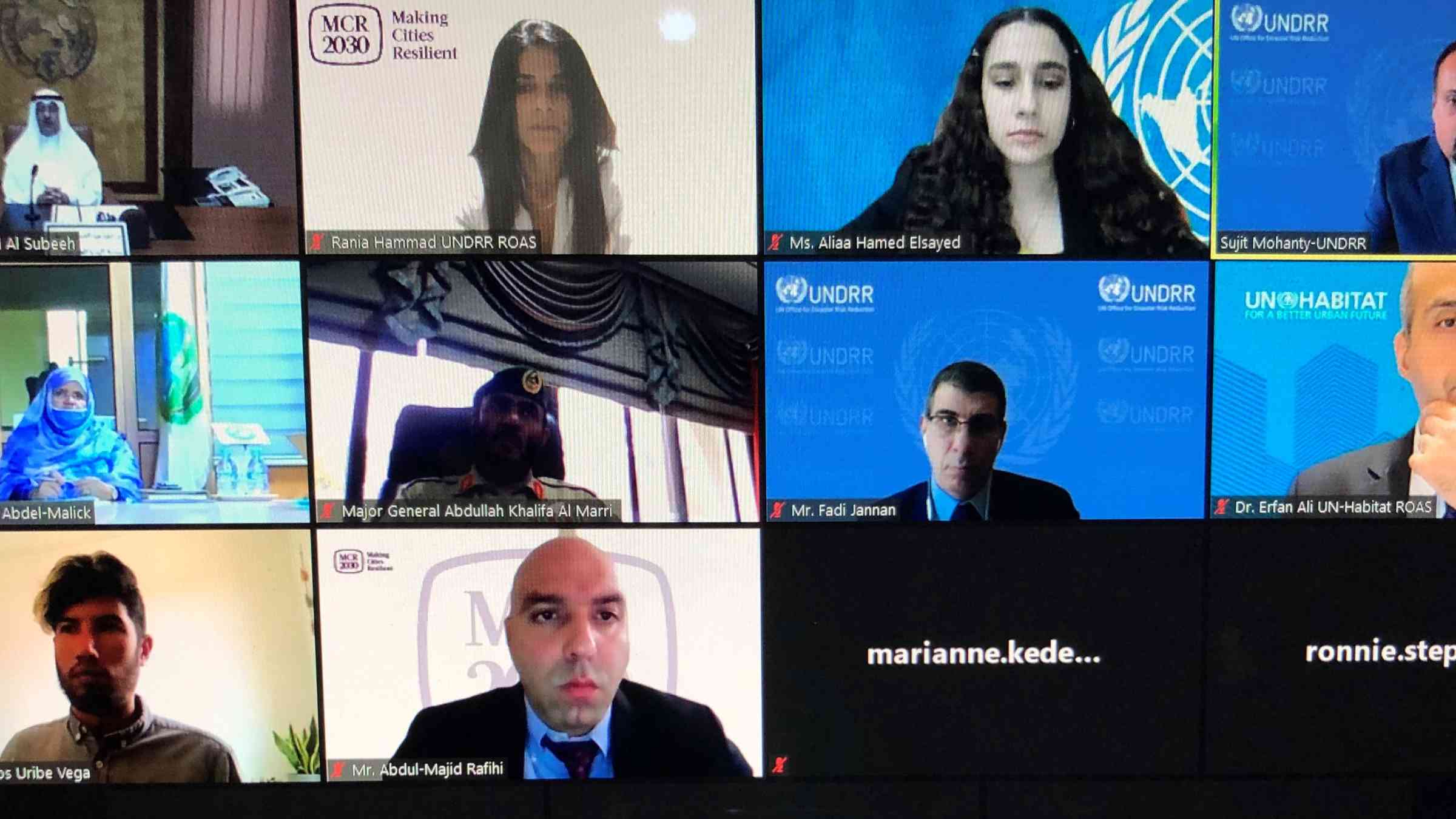UNDRR ROAS Making Cities Resilient 2030 Webinar: Our Future is Urban

The United Nations Office for Disaster Risk Reduction (UNDRR), Regional Office for the Arab States (ROAS), in collaboration with the Arab Towns Organization, organized a webinar titled “Arab Cities towards Resilience: Introduction to Making Cities Resilient 2030 Program,” with the participation of the Regional Council of Nouakchott, Dubai Police, UN-Habitat, and UCLG World Secretariat. The webinar represented a platform to empower the local governments and support their efforts to reduce risk and build resilience through the Making Cities Resilient 2030 (MCR 2030) Programme, which was launched by UNDRR ROAS in November 2020.
Rapid and informal urbanization is a major risk driver. With more than 55% of our population living in urban areas, cities are on the front line of both climate impact and climate action. For the record, in 2018, 32 out of 33 megacities were highly vulnerable to disaster-related mortality from at least one of the six types of natural disasters.
The MCR2030 Resilience Roadmap guides cities through sustainable development towards resilience. It helps cities understand where they are on their resilience journey and provides insight and partnership opportunities to ensure they are safe, inclusive, resilient, and sustainable.
“Nothing undermines development like a disaster,” said Sujit Mohanty, Chief of the UNDRR Regional Office for the Arab States, highlighting solutions, “every US$1 invested in risk reduction and prevention can save up to US$15 in post-disaster recovery. Every US$1 invested in making infrastructure disaster-resilient saves US$4 in reconstruction.”
Mohanty tackled the tragic results of the COVID19 pandemic and how it has shown us that disasters do not wait in turn, “six years ago, UN Member States included health and biological hazards in the Sendai Framework, five years later the COVID-19 pandemic arrived, and few countries had equipped themselves to deal with it.”
Ahmed Hamad Al-Subeeh, Secretary-General of the Arab Towns Organization highlighted the successful development plans in a number of Arab cities and the role of the local governments in development work, adding, “in light of the current changes and developments, a vision for cities has never been more important than it is today. Cities are facing great challenges that require urban action plans and programs that qualify them to know the risks and prevent them.”
In her turn, Fatima Bint Abdel-Malick, President of the Regional Council of Nouakchott presented the hazards that are facing Nouakchott, “the city is fragile under the dangers of the triad of water, sand, and salt, three dangers that pose major environmental challenges, in addition to, the problems of waste, environmental pollution, and sanitation.” She then highlighted the action plan for disaster risk reduction that was formulated for the city of Nouakchott, as a result of the city joining the Making Cities Resilient 2030 Programme. The action plan outlines the main activities that will be implemented over a period of five years (2019-2023), the entities responsible for the implementation, and the required financial resources.
General Abdullah Al-Gheith, representing the Commander-in-chief of Dubai Police General Abdullah Khalifa Al Marri, reflected on Dubai’s commitment towards disaster risk reduction and the city’s effort and innovative solutions in developing resilient cities and communities. He highlighted the crucial role of the partnership between the Government of Dubai and the United Nations Office for Disaster Risk Reduction.
“The Arab region is the most water-scarce and food-import-dependent region in the world with only 1.4% of the world’s renewable fresh water and the only region where malnutrition rates have been rising,” said Dr. Erfan Ali, Regional Director of UN-HABITAT in his intervention. He presented the challenges facing the Arab region, with over 80 million people living in informal areas that are often unsafe and lacking access to basic services, in addition to being home to the world’s largest population of refugees and displaced people. “All these challenges call for maximizing efforts to build the resilience of cities and urban areas to better anticipate, prevent, respond to, and recover from potential shocks in the economic, social, political, technological, and environmental domains,” Dr. Ali stated.
Juan Carlos Uribe Vega, Learning Officer of UCLG World Secretariat, presented the resilience learning tools and resources produced by the UCLG. “Peer learning is one of the key actions for cities to share their experiences and projects on resilience, and we established some engagement mechanisms for that,” he stated.
An overview of the MCR2030 programme’s strategic objectives, its benefits for cities, the role of local governments and the private sector, as well as guidelines on the signing up process were presented in the webinar.
Making Cities Resilient 2030 (MCR2030) is a unique cross-stakeholder initiative for improving local resilience through advocacy, sharing knowledge and experiences, establishing mutually reinforcing city-to-city learning networks, injecting technical expertise, connecting multiple layers of government, and building partnerships.
MCR2030 will connect thousands of cities and help them share knowledge and resources. Everyone is the right person to lead the change, including private sector entities, where they can offer technical one-to-one advice and support cities in the formulation and implementation of the resilience actions.
Last but not least, in thirty years’ time, as many as two-thirds of us will live in urban areas. If we want to solve our biggest challenges, achieve the Sustainable Development Goals, and create a socially, economically, and environmentally sustainable future, we need to get our cities resilient.
Making Cities Resilience 2030 is here. Join us https://mcr2030.undrr.org/

